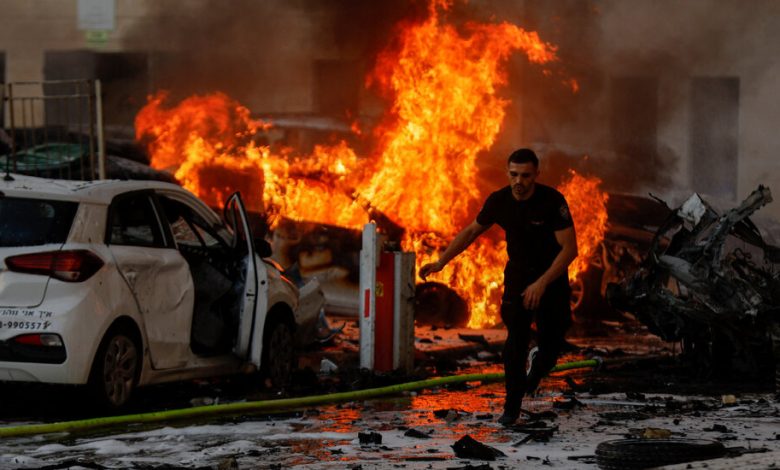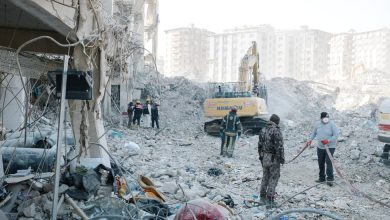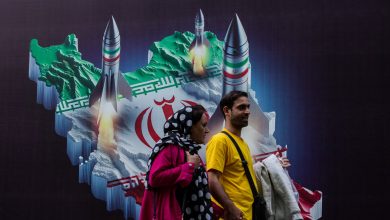‘We Are at War,’ Netanyahu Says After Hamas Attacks Israel

Israel battled on Saturday to repel one of the broadest invasions of its territory in 50 years after Palestinian militants from Gaza launched an early-morning assault on southern Israel, infiltrating 22 Israeli towns and army bases, kidnapping Israeli civilians and soldiers and firing thousands of rockets toward cities as far away as Jerusalem.
By early evening, the Israeli military said fighting continued in at least five places in southern Israel; multiple Israelis had been abducted and taken to Gaza, including an elderly grandmother; and at least 250 Israelis had been reported dead by officials and more than 1,400 wounded. Israel retaliated with huge strikes on Gazan cities, and the Gaza Health Ministry said at least 234 Palestinians had been killed in either gun battles or airstrikes.
In an assault without recent precedent in its complexity and scale, the militants crossed into Israel by land, sea and air, according to the Israeli military, leading to some of the first pitched battles between Israeli and Arab forces on Israeli soil in decades.
Unverified video footage, circulated by Hamas, the Iran-backed militant group that controls the Gaza Strip, appeared to show some Palestinian gunmen arriving in Israel in a sort of makeshift hang glider.
Residents of Israeli border towns told broadcasters that gunmen were moving door to door, looking for civilians. Unverified footage appeared to show Palestinian fighters transporting captured Israeli civilians and bodies through the strip — to be bargained, analysts said, for Palestinian prisoners.
In Sderot, a southern city, photographs showed dead bodies strewn on the streets. The militants also targeted an all-night dance festival in the desert, prompting hundreds of young Israelis to sprint for safety.
“We are at war and we will win it,” Prime Minister Benjamin Netanyahu of Israel said in a televised statement, announcing a call-up of hundreds of thousands of Israeli military reservists.
Muhammad Deif, the leader of Hamas’s military wing, said in a recorded message that the group had decided to launch an “operation” so that “the enemy will understand that the time of their rampaging without accountability has ended.” He cited Israel’s occupation of the West Bank, which it captured during the Arab-Israeli war of 1967, recent Israeli police raids on the Aqsa mosque in Jerusalem and the detention of thousands of Palestinian militants in Israeli jails.
The potential role of Iran in the operation drew scrutiny in Israel as the violence spread to other parts of the region. In addition to Hamas, Tehran backs another Palestinian militant group, Islamic Jihad, and Hezbollah, the Lebanese militant group, providing all of them with weaponry and intelligence.
Hamas leaders called for Arabs living in Israel and the West Bank to seize the momentum created by the assault and carry out their own attacks on Israelis. Three Palestinians died in clashes on Saturday with Israeli security forces in the West Bank, according to Palestinian officials.
United Nations peacekeepers said they were bolstering their activity on Israel’s border with southern Lebanon, where Hezbollah holds sway, particularly after a skirmish with Israeli troops along the border on Saturday.
The timing of the assault was striking, hitting Israel at one of the lowest moments in its history. It followed months of profound anxiety about the cohesion of Israeli society and the readiness of its military, a crisis set off by the far-right government’s efforts to reduce the power of the judiciary.
And the violence came 50 years and a day after the Yom Kippur War of 1973, when Israel was also surprised by an Arab attack on multiple fronts, leading to huge Israeli losses and soul-searching about the state of the country.
The shock of the attack appeared to rekindle a sense of unity among Israelis, as government critics who had resigned from reserve duty in protest of the judicial plan announced they would return to service in Israel’s hour of need. Yair Lapid, the centrist leader of the opposition, announced he was prepared to join a government of national unity — a move that would potentially postpone any further judicial changes and allow Mr. Netanyahu to end his alliance with the far right.
The attack also coincided with Israel’s escalating efforts to seal a landmark peace deal with Saudi Arabia, which has never recognized the Jewish state out of solidarity with the Palestinians, but had seemed ready to change its policy. It was not immediately clear how the normalization effort would be affected. The Saudi government issued a statement of concern about the situation and called for a cessation of hostilities.
Mr. Netanyahu spoke with President Biden by phone on Saturday afternoon, his office said, telling Mr. Biden that “a forceful and continued battle will be required, in which Israel will triumph.” In his own statement, Mr. Biden said that “the United States unequivocally condemns this appalling assault against Israel” and that “Israel has a right to defend itself and its people.”
The ease with which Palestinian fighters entered Israel prompted recriminations and anger among Israelis. There were questions about the quality of Israeli intelligence gathering, normally a point of Israeli pride, and suggestions that the Israeli military — which has focused its recent activity on quelling an insurgency in the West Bank — had misdirected its energies.
Fighting often flares between Israel and Hamas, which refuses to recognize Israel’s existence and regularly organizes attacks on Israelis.
After Hamas — listed as a terrorist group by the United States — seized control of Gaza in 2007 from more moderate Palestinian factions, Israel and Egypt placed the enclave under a blockade, deepening the dire humanitarian situation there. Unemployment is close to 50 percent in the Gaza Strip, and only 10 percent of Gazans have direct access to clean water, according to UNICEF.
Hamas militants have occasionally broken out of Gaza, which is surrounded by both walls and fences, as well as subterranean fortifications to prevent tunneling into Israel. But they have never penetrated so deep into Israeli territory, for so long or in so many places. Militants are believed to have captured the remains of two Israeli soldiers during the 2014 war with Israel and held an Israeli soldier hostage for five years until 2011, when he was released in a prisoner swap.
The scale of the latest Palestinian attack shocked Israelis, many of whom were observing the Jewish Sabbath. Diplomats and analysts, too, were caught off guard. They had expected the Gaza front to remain quiet for the foreseeable future, after international mediators appeared to have persuaded Hamas to end a recent weekslong series of riots and protests on the border with Israel.
In recent months, Israel had been allowing up to 18,000 workers to cross daily from Gaza into Israel, helping Gaza’s economy and adding to a general sense that calm would prevail.
Hamas’s rocket arsenal was considered to be its primary weapon because the Israeli Army had secured the land border with walls and other fortifications, making a ground invasion difficult.
But early Saturday morning, Palestinian militants appeared to circumvent the border with relative ease, swiftly forcing their way through gaps in the fortifications and fanning out into several towns, army bases and the city of Sderot.
The head of a local council in southern Israel, Ofir Libstein, was killed in a subsequent gunfight with militants, the council announced.
In desperate interviews with Israeli broadcasters, residents of the Israeli border towns said the gunmen were walking through their houses, forcing them to barricade themselves in their bomb shelters — a common feature of Israeli homes.
The Israeli response came first by land, in the towns invaded by militants, and then by air, as its air force struck multiple locations across the Gaza Strip.
Gazan civilians had first reacted with jubilation to the attacks on Israel, as crowds greeted returning militants like heroes, video showed.
But those celebrations quickly turned to fear as the Israeli response began.
The streets of Gaza City, the enclave’s largest urban area, emptied out as residents gathered at schools to take shelter. Lines also formed at supermarkets, as people stocked up on supplies. And Gazans living close to the Israeli border fled to areas further inside the enclave, fearing an Israeli ground invasion.
“We can’t take it anymore,” said Jamila Al-Zanin, 39, a mother of three, who was one of those who fled with their families away from the border. “The situation is really, really bad.”
The Israeli government said Saturday evening that it was cutting off its electricity supply for Gaza, which gets two-thirds of its power from Israel.
Analysts expected the Gaza war could set off a surge in violence in the West Bank, which has already experienced its bloodiest year since the second intifada, a Palestinian uprising that left 1,000 Israelis and around 3,000 Palestinians dead by the time it ended in 2005.
More than 200 Palestinians have been killed in the West Bank so far this year, often during gun battles between militants and the Israeli Army — a two-decade high. At least 36 Israelis had been killed this year before Saturday’s attack — also a two-decade high.
The Hamas assault was condemned by most Western countries, but praised by Israel’s enemies — including Hezbollah and Iran, who saw it as a sign of Israeli weakness.
The spokesman for Iran’s Ministry of Foreign Affairs, Nasser Kanani, said that “today’s operation opened a new chapter in the field of resistance and armed operations against the occupiers in the occupied territories.”
Reporting was contributed by Raja Abdulrahim from Istanbul; Jonathan Rosen and Gabby Sobelman from Rehovot, Israel; Iyad Abuheweila from Cairo; Aaron Boxerman from London; Euan Ward and Hwaida Saad from Beirut, Lebanon; and Rami Nazzal from Ramallah, West Bank.




